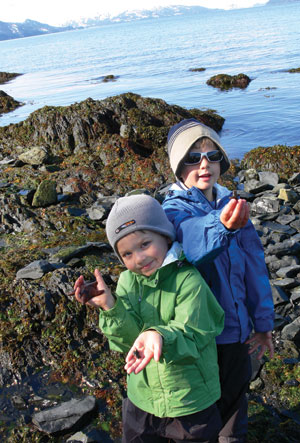BY CARRIE SIMMONS
 In the years I’ve spent traveling this great green earth producing the television series Travel With Kids, I have learned a lot from the locals. From utilizing traditional knowledge—jungle vines in Moorea contain drinking water, which plants in Wales relieve Stinging Nettle pain, and plants you can eat in the Amazon—to thinking outside the box for modern solutions, people around the world are implementing innovative “green” strategies. The ECO-cation my kids receive lingers way beyond the trip itself, infiltrating their everyday outlook on the world, and forming eco-friendly habits at home.
In the years I’ve spent traveling this great green earth producing the television series Travel With Kids, I have learned a lot from the locals. From utilizing traditional knowledge—jungle vines in Moorea contain drinking water, which plants in Wales relieve Stinging Nettle pain, and plants you can eat in the Amazon—to thinking outside the box for modern solutions, people around the world are implementing innovative “green” strategies. The ECO-cation my kids receive lingers way beyond the trip itself, infiltrating their everyday outlook on the world, and forming eco-friendly habits at home.
Ocean Protection
My family members are avid scuba divers, and soldiers in the fight to save the ocean and protect its inhabitants. One of the most informative ocean camps my kids attended came from an unlikely source. The Breakers Resort Palm Beach offers a sustainable twist by teaching eco-knowledge in their children’s camp. Since the Florida coastline is home to nesting turtles, The Breakers taught our kids all about these dino-ancestors and what needs to be done to protect their habitat—everything from limiting lighting on beaches to marking and protecting nesting sites. After witnessing a giant turtle laying eggs, and helping a naturalist count and re-bury them, the kids were enamored with turtles.
In Alaska, we learned the long-term impact of pollution on other ocean animals. On-board an Auklet Charters boat in Prince William Sound, we watched dolphins play at the bow of the boat and seals popped their heads up to say hello—picture-perfect. Later, our captain dug down a few inches on one of the beaches and revealed oil-soaked sand left over from the Exxon Valdez spill that occurred more than two decades prior. Captain David gave the kids a firsthand account of the oil spill, clean-up efforts, and the ongoing aftermath, including the effects on otters that dig for clams on their beaches.
Alternative Energy
Alaskans have also created innovative ways to harness energy in the icy north. On the same trip, at Chena Hot Springs Resort just outside Fairbanks, we witnessed how innovative thinking and technology turned a spa attraction into an energy source. The resort runs pipes from the hot springs under the cabins to heat the rooms, and utilizes geothermal energy to spin turbines for power, making them completely self-sufficient…even in the cold Alaska winters.
At the Center for Alternative Technology in Wales, the kids were fascinated by the tramway, which used water instead of electricity to power the trams. Two trams rise and fall on a pulley system—the tram at the top fills its tank with water while the bottom tram empties it, enabling them to trade places using no traditional energy or carbon footprint. The water is re-routed from a nearby river and released after use. In nearby St. David’s, Andy Middleton, environmentalist and owner of TYF Adventure, takes transportation innovation one step further. He drives a car that runs on chip fat (French fry grease to us Americans) – you know, the stuff left in the pan after the “chips” come out. But Middleton says you don’t have to go to that extreme. “It’s about getting out and exploring the world—on foot…on bike.” And he says we can do better than leaving no footprint: “Leave it better. Pick up garbage as you go.”
Sustainability
When it comes to eco-friendly hotels, two beach properties stand out—Maho Bay Camps in the Virgin Islands and Eco-Tulum’s Zahra Bungalows in the Mayan River built low-impact structures designed to champion sustainability and minimize carbon footprint. Both hotels take nighttime “breaks” to conserve electricity (visitors are given candles and flashlights), they collect water from rain catchments, and utilize solar heating, and the list of eco-friendly features goes on and on. The Maho Bay’s tent camps are actually built on platforms above the jungle floor to avoid disturbing the foliage.
What the kids and I have taken away from our travels is that going green is possible in many areas and enjoyable. They felt inspired and empowered by the locals in these destinations, to act and do something on their own to protect the earth. Whether recycling (even turning would-be-trash into art), picking up trash at the park, on hiking trails and on the beach, respecting coral reefs while snorkeling, or resisting to feed wild animals – the kids felt like they were making an impact – a key ingredient to going green.





